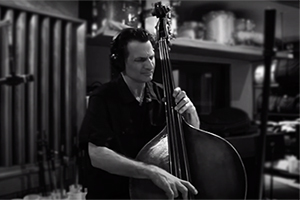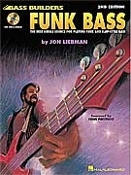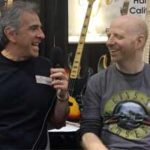Bass virtuoso’s first-hand account of his latest collection of Brazilian music
Exclusive interview with FBPO’s Jon Liebman
August 10, 2020
Multi-Grammy Award winner John Patitucci is an iconic figure in the world of jazz bass. Since being catapulted to instant worldwide acclaim in the mid-‘80s when he joined Chick Corea’s Elektric and Akoustic Bands, John has also held a longstanding position in Wayne Shorter’s band in addition to cultivating his own stunning career as a solo artist.
John has worked with jazz greats Herbie Hancock, Dizzy Gillespie, Wynton Marsalis, Pat Metheny, and Stan Getz, as well as a varied list of blues, pop and Latin artists, including B.B. King, Bonnie Raitt, Queen Latifah, Sting, and Carly Simon.
Ever passionate about Brazilian music, John is excited to discuss his latest project, a remixed, remastered version of his 2017 album, Irmãos de Fé, previously available only on vinyl. FBPO’s Jon Liebman spoke one-on-one with his longtime friend to get the details on the making of the album and its new digital version, which was released August 8.
FBPO: Congratulations on the new release, John, Irmãos de Fé. That means “Brothers in Faith,” right?
JP: Yeah. The original title of the song is “Irmão,” which means “Brother in Faith,” but I made it plural because of three of us.
FBPO: Okay. I wasn’t sure if that was a typo or not. [Laughs]
JP: No, no, no, it’s for real.
FBPO: You’ve been a big fan of Brazilian music for a long time.
JP: Very long, very long.
FBPO: What is it about Brazilian music that makes it so special to you, and what prompted you to make this record?
JP: Well, I have a long relationship now with Brazilian music. In the early eighties, I started playing gigs with Brazilian masters in LA. Oscar Castro-Neves was there, Moacir Santos was there, and I wound up getting the gig with Airto and Flora (Purim). That was a big deal for me. It was kind of special and it was amazing. It changed my life in terms of my ability to understand and start dealing with Brazilian music. He was such a great teacher of it too, Airto was. He taught me the basic stuff for each of the grooves. It was a tremendous help. It was like really, really special and he made us feel so good and kind of spoiled me. [Laughs] I would play with guys that weren’t necessarily from Brazil and it never sounded the same. [Laughs]
FBPO: He brought that authenticity, huh?
JP: Oh my gosh! And he was so relaxed about teaching it and really cool. He was just tremendous, a great player.
FBPO: There’s a lot I could ask you about Airto, but that would take the interview in a whole different direction!
JP: Yeah, yeah, yeah. He was one of the first to really teach me then. Then word gets around that there’s a young guy in town who was really into playing this stuff, and up for learning it too. I started getting a ton of gigs with all these different people. I mean, the beauty of it all was all of the sudden I started playing, and I got to play with Ivan Lins and Dori Caymmi, and all these amazing Brazilian artists. Then I got exposed to, even from the beginning with Airto and Flora, to music of not just Jobim but Chico Buarque and Egberto Gismonti, and the music of Hermeto Pascoal, who’s a genius, and all these people, and it’s really exciting. I think it’s the combination. Danilo Pérez says it well: The rhythmic music of Africa and the power of its rhythm, went all over the world and changed the music of all countries, changed the music of Cuba, it changed the music of Brazil, changed the music of Peru, every South American and Central American country, and in North America for that matter, was totally altered by the greatness of those African rhythms.
FBPO: Very true.
JP: But what he says is the most complete package of how to use them, with a lot of changes in melodies, kind of happened in Brazil. That they were the ones who combined it in such a huge way, in his opinion. The other countries, they brought in the harmonic invention as time went on, but for years, a lot of the other countries, their harmonic thing was a lot of one, four, five, and folk-ish.
FBPO: This album, Irmãos de Fé, is a really beautiful collection of songs. And it definitely sounds like a John Patitucci record!
JP: Oh, good. All right. Oh, cool!
FBPO: How did you go about choosing the music?
JP: Well, I have two experts in the band on Brazilian music. Yotam Silberstein, even though he’s from Israel, is a guy who knows thousands of Brazilian songs committed to memory. He even speaks Portuguese! He’s a fanatic for Brazilian music, so he knew so much stuff. Then my buddy Rogerio Boccato was also on the drums for the record. He was very instrumental, so that we could pick tunes that weren’t the ones that get played all the time and some ones that were a little different and yet classic, beautiful. Like, “Sinha.” I worked with João Bosco many years ago and he was on one of my records, on Mistura Fina. He and Chico Buarque wrote that beautiful piece called “Sinha,” the one with the six-string bass intro and all the stuff.
FBPO: There’s a powerful message in that song, isn’t there?
JP: That’s a heavy statement about civil rights and justice, because “Sinha” is a story about a slave who was an older slave, an African man in Brazil, who was accused by his master of looking at his wife bathing in the river. The guy was like, the words are saying, “Look, I’m nearly blind. I wasn’t looking, I don’t even care. I’ve been oppressed. You’ve taken so much from me for so many years. Why would you accuse me of this on top of it?” So there’s a lot of stuff. “Faithful Brother” by (Milton) Nascimento that we did is also a statement about what it means to be brothers. There’s a timeliness to the record that I didn’t even know, because the record on vinyl was released a few years ago. Not that these things haven’t been timely for 400 years, because they have been, the discussion, injustice and racial hatred and stuff like that. So there was a definitely a socially conscious message in some of the tunes we chose. Then a lot of the things we just chose because they’re just flat out gorgeous!
FBPO: It’s interesting that you play upright almost exclusively throughout the record. You mentioned the six-string electric, but there’s an awful lot more upright than electric.
JP: Yeah. Although there is a four-string bass solo on the one called “Samba Do Grande Amor.”
FBPO: There’s also a song called “Pr’ um Samba.” The slow tempo on that one really brings out its haunting melody!
JP: Well “Pr ‘um Samba” is not a samba at all. It’s kind of a samba-canção, a slow kind of samba.
FBPO: I also want to mention that the arco playing you did on “Ohla Maria” is beautiful, just beautiful.
JP: Oh, thank you. That was a tune that I heard, do you know the great guitarist, classic New York guitarist on nylon string, named Gene Bertoncini?
FBPO: Sure!
JP: One time we were doing a benefit for, it was when Haiti had the earthquake. We did a benefit concert. We were playing all these original things and different things and he got up and played solo guitar, he played “Olha Maria” and I just freaked. I went, “Wow! That’s one of the most beautiful songs I’ve ever heard in my life from anybody.” That’s the thing about the record. It’s a very melodic, lyrical record. The tunes are not even that long. It’s really about the melodies, ‘cause the Brazilians, boy, they can write melodies for days. I love that. As much as I’ve been a part of a lot of burning music and stuff, I love to play ballads and I write a lot of more lyrical, romantic music as well. But this was a way of putting that out a little bit stronger.
FBPO: I also really liked was the matched octave lines in “Desvairada.”
JP: Oh, “Desvairada.” We were calling that “Mount Desvairada!” We had to scale it down to play that one. That’s a really hard thing to play on the double bass. I was like, “I don’t know, I don’t know if I can do this, guys! [Laughs] That’s kind of like those choros and chorinhos and that music. But this one was in three, and it was fast as all get-out. So it was, it was definitely a big challenge.
FBPO: I love it! You mentioned Mistura Fina earlier. How would you compare Irmãos de Fé to that one?
JP: This was a much smaller project in terms of orchestration. It was just, by nature, it was a more intimate record. Mistura Fina had all kinds of people on it. That was in the days, Jon, also when we had bigger budgets! [Laughs]
FBPO: Those were the days, huh?
JP: Those were the days of the bigger… I had a pretty nice record deal with GRP for years and then right after Mistura Fina, I had a long run with Concord for a while. It was really, really nice to have somebody else pay for the record. But this one, this was on Newville, the vinyl company. They’re great people and they paid for the record, but it was a very small budget. The cool thing about it was they said, well, after three years, go by, you can have the record back. And then if you want to release digitally, you can do all that. Just, you’re not allowed to make vinyl records.
FBPO: I do love the sound of a vinyl recording, but it is great that this album is now available in digital format.
JP: Sure, sure. I love John Davis. He was one of my students years ago, but he’s the guy who owns the The Bunker Studios in Brooklyn. In fact, the same mastering engineer remastered it too, same guy who did the original mastery. Both engineers are great. Mark Urselli did the original one for the vinyl. But John knows me and what I like and it was nice to have him do the remix.
FBPO: Was the thinking all along that you were going to re–release it in digital format after three years?
JP: Well, it was what I wanted to do. I just, it was like, well, I hope I have the money to pay for the extra stuff when it comes around, you know what I mean? ‘Cause you know, you have to remix it, that costs money, and then you got to master it again, and that costs money. But it wasn’t that much compared to a full budget for a record. It’s nothing.
FBPO: Is it available on CD or just digital now?
JP: No, just digital now. No, we didn’t print up CDs because that would obviously be another cost. And nowadays it’s not so sure, unless you sell them at the gigs. But if it turns out that there’s enough demand for it, maybe we will make up some CDs as well. We’ll see.
FBPO: No cassettes or 8-tracks?!
JP: No, no, none of that. [Laughs]
FBPO: How did it feel doing the remixing and remastering? Was it like reliving the whole experience of making the record?
JP: Yeah, it was fun. And the three of us were very much connected to this remix as well. I included the other guys in it because they had played a huge part in this thing. They helped choose the music and they played beautifully, and it was a really kind of intimate. I know Rogerio, and his family and mine are very close. We do church planting together and all kinds of stuff.
FBPO: So bringing in Rogerio and Yotam must have seemed like an obvious choice, like a no brainer, for the original recording.
JP: Well, yeah, because, again, Yotam is phenomenal expert on the music, plus Rogerio was the one who told me about Yotam because he’s much younger than I am. When he started coming on the scene in New York, when he moved here from Israel, Rogerio was saying, you’ve got to check out this guitar player. He’s like really amazing. He’s not only a great jazz musician, he’s an expert on the Brazilian stuff. So I said, well hey, let’s check it out. I heard his record, The Village. I saw some YouTube clips of him and I went, Wow, I love the way this guy plays. He sounds like an old soul.
FBPO: Israel seems to grow some great jazz players.
JP: Well there’s quite a history for a long time. It started with Arnie Lawrence, from New York, going there and starting those schools and all that kind of stuff. He was a pioneer.
FBPO: I interviewed Oz Noy, I interviewed Teymur Phell. I’ve never interviewed Avishai Cohen, but I’m just, all of the sudden, thinking of all these great musicians who came from Israel.
JP: Teymur came to me for some lessons at one point and I was like, Wow, I really liked the way you play, man. That sounds great.
FBPO: I know! He’s really into the 6-string.
JP: Yeah. We had a nice time together and he’s a very cool guy.
FBPO: Yes, he is. So what else, John? What’s coming up? What’s next?
JP: I’m scoring a film and it’s a very heavy thing. It’s all about the gang violence and the police corruption, and the whole state of affairs in Chicago. It’s called Chicago: America’s Hidden War. This guy, a friend of mine, his name is Dimas Salaberrios, he is a pastor, but he grew up in a tough situation in South Bronx. He went through a lot of stuff as a young African American and was in prison, the whole nine yards, and God sort of got ahold of him and made him a pastor. He started really helping the people in that community in the South Bronx. He did a movie that won an award. He was part of the documentary called Emmanuel. It was about the church shooting where that white supremacist kid in Charleston, South Carolina, went into a bible study and he killed almost everybody. You heard about that?
FBPO: Absolutely. Yes.
JP: So Dimas went there and interviewed all the people and they created this beautiful documentary. It’s like amazing, these people are amazing. They even publicly, somehow, were able to forgive this guy, which I mean… that’s hard to imagine. Dimas is of Puerto Rican heritage as well. He’s a great guy, really cool. I just knew him from church years ago. Our church really admired what he was doing. We were helping to come alongside and support his ministry ‘cause he was doing the serious thing. A lot of people talk about doing stuff, but he was actually doing it.
FBPO: What kind of scoring are you doing for the film? Is it an orchestra, a jazz group, or…?
JP: Oh, it’s… again, it’s a documentary, so it’s a low budget movie, but he really put a lot of faith in me. I’ve been doing stuff with bass, electric bass choirs, acoustic bass things. Sullivan Fortner, the great pianist, is going to play. There’s some string quartet writing I did. It’s just a combination of different elements. I wanted it to have some of the blues in there and soul but not be overt about it, just kind of in there. There’s no drums, it’s a very heavy movie.
FBPO: Is it an indie project? Will it be on Netflix? Where will people be able to see it?
JP: I think they got a distribution deal. There’s a subsidiary of Magnolia, that production company that sells a lot of movies. I think they’re going to distribute it.
FBPO: That’s great, John. Congratulations.
JP: Boy, I was scared. When he told me all about it, it sounded amazing. I was like, man, you sure you don’t want to get Terence Blanchard to do this movie because I’m scared! [Laughs]
FBPO: When’s the target release date?
JP: I’m not sure. I have to hand it in at the end of this month, so I don’t know. Sometimes after you’re done with it, they take it around and play it for people and check out response and see what’s going to happen, how it’s going to be received. I don’t know whether they’re going to release it in the fall. I’m not sure.
FBPO: Well, the current state of the world could have an effect on it too. I’ve got a new book that was supposed to be out for Summer NAMM and, there was no Summer NAMM! They still don’t know when it’s going to come out. This is my 10th book with Hal Leonard.
JP: Wow! Congratulations.
FBPO: Thanks.
JP: I remember the first one! [Laughs]
FBPO: I’m sure you do. You wrote the foreword! That’s why I brought it up.
JP: Yeah!
FBPO: It’s so great catching up with you, John. Last time we saw each other was in London back in September.
JP: That’s right! Doesn’t that seem like a lifetime ago?
FBPO: The world sure was different then. And that interview we did in Detroit was almost three years ago.
JP: That was fun.
FBPO: Yes it was. I remember sitting on the riverfront with you and Michael Brecker’s wife walked by, right in the middle of it. And she said, “Hey John! How are you doing?”
JP: [Laughs]
FBPO: Congratulations again on the new release, John. It’s always great talking to you. We’ll watch for the film too and everything else.
JP: Well, thank you brother. I’ll see you before too long, I hope, when things open up.
See Jon’s blog, with key takeaways from this interview, here.
The new, remastered edition of the John Patitucci Trio’s Irmãos de Fé is available here:
Jon Liebman’s Funk Bass book, foreword by John Patitucci, is available in the FBPO store:








